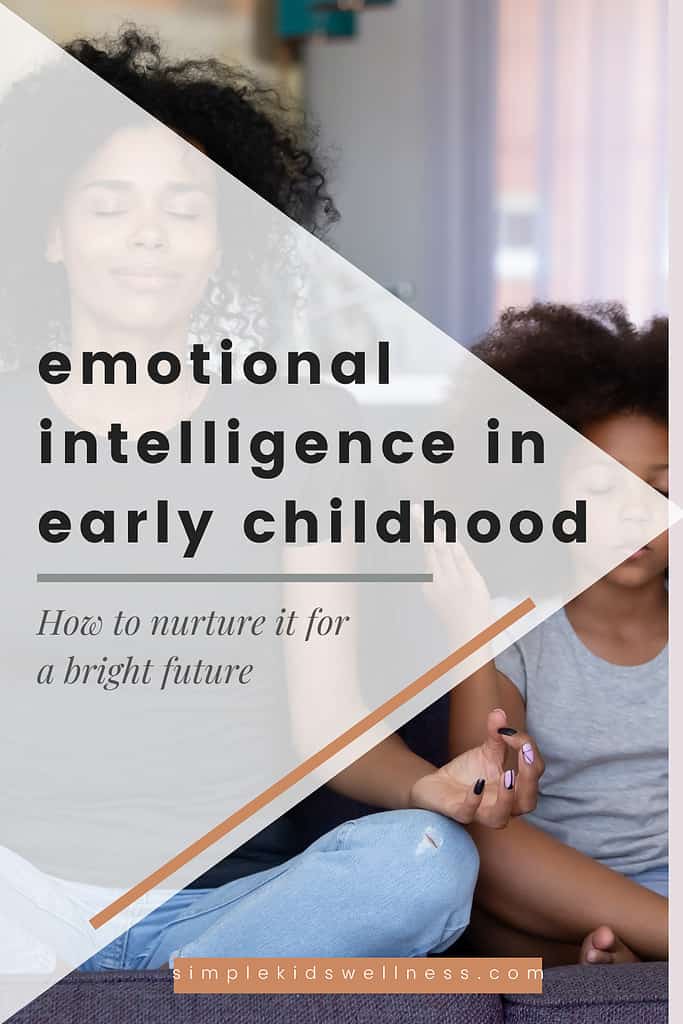Nurturing Emotional Intelligence in Early Childhood for a Bright Future
I’m so pumped to talk about one of my favorite subjects today – emotional intelligence in early childhood!
As a parent, there’s nothing more important to me than setting my little ones up for success in life, and emotional intelligence is a huge piece of that puzzle. I’m so intentional about it, I prefer to homeschool preschool , use some of these homeschool preschool activities, and then investigate options.
(And if you’re considering homeschooling but aren’t sure you can afford to stop working, check out tips for homeschooling on a budget).
But, what the heck is emotional intelligence?, you might be wondering.

Stick with me here.
Emotional intelligence is basically the ability to understand and manage your own emotions, as well as empathically handle the emotions of others. And it’s a huge factor in overall success and happiness.
So, let’s dive in and learn how we can nurture this essential skill in our kids!
What is Emotional Intelligence?
First things first, let’s define what we’re talking about here. Emotional intelligence is the ability to recognize, understand, and manage your own emotions, as well as the emotions of others. This includes things like empathy, self-awareness, and emotional regulation. Basically, it’s about being in tune with your feelings and those of the people around you, and using that information to navigate life in a healthy and productive way.
Why is Emotional Intelligence in Early Childhood Important?
Now that we know what emotional intelligence is, let’s talk about why it matters for our kiddos. Emotional intelligence has been linked to all sorts of positive outcomes, including better relationships, higher academic achievement, and even better physical health. If you can nurture emotional intelligence in early childhood, you can set your child up for more success in school and in their friendships later on, according to the American Psychological Association. It can also help kids handle difficult emotions and stressful situations in a healthier way.
How to Nurture Emotional Intelligence in Early Childhood
So, how can we help our kids develop their emotional intelligence? There are four aspects: self awareness and self management, and social awareness and relationship management. It all starts with setting a good example. When we model healthy coping strategies and emotional regulation, our kids are more likely to pick up on those behaviors. We can also encourage them to talk about their feelings and help them label their emotions. And don’t be afraid to get silly!
Role-playing different emotional scenarios can be a fun and effective way to help kids understand and manage their emotions. You can do this with pretend play, puppets, drawing, or simple charades.
Here are some helpful games to get you started! All of these are appropriate for preschoolers and encourage a lot of interaction between you and your child to nurture emotional intelligence in early childhood.
- Who’s Feeling What? Social Emotional Game This game has a customizable board that allows you to change the game each time it is played.
- Feelings and Emotions Puzzle Cards This is more a matching game, with a real person’s face that needs to be matched to an emoji type face.
- La La Llama Social Emotional Game This is an activity in which your child uses the felted facial pieces to recreate the face on the card.
- Free St. Patrick’s Day Activities includes 18 different emotions in a fun leprechaun-themed format. Includes ideas for different games.
Another great way is through reading together. You can read books that focus on different emotions, like sadness, anger, excitement, or fear. Nurturing emotional intelligence in early childhood doesn’t mean that we read books specifically written about feelings, though. Those books are often boring, just saying. Instead, we can choose books that feature a sad event, for example, and talk about what happened in the story.
The Power of Empathy
One key aspect of emotional intelligence is empathy, or the ability to understand and share the feelings of others. This can be a tough skill for kids to grasp, but it’s so important. Children are capable of learning empathy even as toddlers, so don’t wait! We can help by teaching them to put themselves in someone else’s shoes and encouraging them to show kindness and compassion. Practicing active listening is another great way to help kids develop empathy.
We start by noticing the outward signs that someone is sad, happy, angry, etc. and pointing them out to our child. For example, we can say, “Gee, Ben’s shoulders are slumped and he’s crying. Do you think he might be sad? What do you think he might be sad about?” This nurtures emotional intelligence in early childhood by helping our children see the association between body language and emotion. They can think about how they would feel in the same situation. And, through mindfulness practices, know how their own bodies show emotion, which increases their ability to recognize those signs in others.
Empathy increases their connection to others and their ability to form friendships.
Mindfulness Matters
Another important aspect of emotional intelligence is self-awareness, or being in tune with your own emotions and thoughts. One way to help kids develop this skill is through mindfulness. Mindfulness is all about paying attention to the present moment without judgment. By taking just a few minutes each day to practice mindfulness, kids can learn to recognize their emotions and thoughts, and respond to them in a healthy way.
Nurturing emotional intelligence in early childhood by helping your children notice tight muscles, fast or shallow breathing, or butterflies in their tummies through mindfulness helps them regulate themselves better. You might think little children are too young for this, but actually, they are much more sensory than we are. Helping them make the connection between their bodies and their emotions helps them better understand themselves and more accurately describe what they feel.
Encouraging Emotional Expression
Finally, it’s important to encourage kids to express their emotions. This can be through words, art, or physical activity. Allow them to let it all out in a way that doesn’t hurt others, not stuff their feelings. They need to know that feelings are just feelings, they are not good or bad, and they change often. They can also learn healthy ways to express their feelings without letting their feelings control them. They get better at this as they get older, of course!
By giving kids the tools to express themselves, we help them develop a healthy relationship with their emotions and nurture emotional intelligence in early childhood.
Another way to help children develop emotional intelligence is by encouraging them to identify their feelings. This can be as simple as asking, “How are you feeling today?” and taking the time to listen to their response.
Other things we can do are: teach them deep breathing techniques, meditation, and positive self-talk.
You can even do these activities together as a family to make it a fun and bonding experience.
In conclusion, nurturing emotional intelligence in early childhood is an important part of setting them up for success. By modeling healthy behaviors, encouraging empathy and self-awareness, and providing opportunities for emotional expression, we can help our kids develop this essential life skill.
So, what are you waiting for? Start nurturing your kiddo’s emotional intelligence today and watch them thrive!








